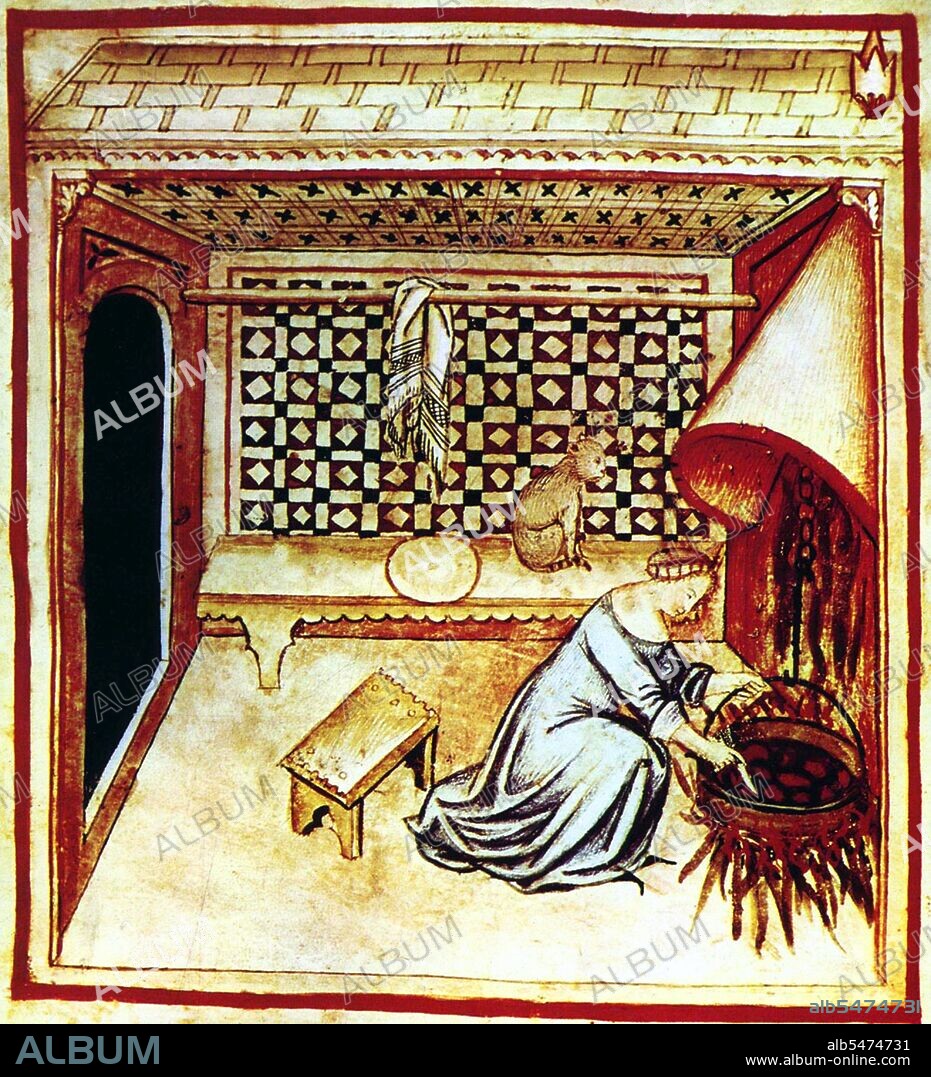alb5474731
Iraq-Italy: Frying food. Illustration from Ibn Butlan's Taqwim al-sihhah or 'Maintenance of Health' (Baghdad,11th century) published in Italy as the Tacuinum Sanitatis in the 14th century

|
Añadir a otro lightbox |
|
Añadir a otro lightbox |



¿Ya tienes cuenta? Iniciar sesión
¿No tienes cuenta? Regístrate
Compra esta imagen.
Selecciona el uso:

Título:
Iraq-Italy: Frying food. Illustration from Ibn Butlan's Taqwim al-sihhah or 'Maintenance of Health' (Baghdad,11th century) published in Italy as the Tacuinum Sanitatis in the 14th century
Descripción:
Traducción automática: El Tacuinum (a veces Taccuinum) Sanitatis es un manual medieval sobre salud y bienestar, basado en el Taqwim al-sihha ????? ????? ('Mantenimiento de la salud'), un tratado médico árabe del siglo XI de Ibn Butlan de Bagdad. Ibn Butlân fue un médico cristiano nacido en Bagdad y fallecido en 1068. Enuncia los seis elementos necesarios para mantener la salud diaria: comida y bebida, aire y ambiente, actividad y descanso, sueño y vigilia, secreciones y excreciones de humores, cambios o estados de ánimo (felicidad, ira, vergüenza, etc.). Según Ibn Butlân, las enfermedades son el resultado de alteraciones en el equilibrio de algunos de estos elementos, por lo que recomendaba una vida en armonía con la naturaleza para mantener o recuperar la salud. Ibn Butlân también nos enseña a disfrutar de cada estación del año, de las consecuencias de cada tipo de clima, del viento y de la nieve. Destaca la importancia del bienestar espiritual y menciona, por ejemplo, los beneficios de escuchar música, bailar o mantener una conversación agradable. Destinado a un público laico culto, el texto existe en varias versiones latinas variantes, cuyos manuscritos se caracterizan por estar profusamente ilustrados. Los breves párrafos del tratado fueron traducidos libremente al latín a mediados del siglo XIII en Palermo o Nápoles, continuando una tradición italo-normanda como uno de los principales lugares para el contacto intercultural pacífico entre los mundos islámico y europeo. Sobreviven cuatro manuscritos completos del Taccuinum de finales del siglo XIV, bellamente ilustrados, todos ellos producidos en Lombardía, en Viena, París, Lieja y Roma, así como ilustraciones dispersas de otros, así como códices del siglo XV.
The Tacuinum (sometimes Taccuinum) Sanitatis is a medieval handbook on health and wellbeing, based on the Taqwim al-sihha ????? ????? ('Maintenance of Health'), an eleventh-century Arab medical treatise by Ibn Butlan of Baghdad. Ibn Butlân was a Christian physician born in Baghdad and who died in 1068. He sets forth the six elements necessary to maintain daily health: food and drink, air and the environment, activity and rest, sleep and wakefulness, secretions and excretions of humours, changes or states of mind (happiness, anger, shame, etc). According to Ibn Butlân, illnesses are the result of changes in the balance of some of these elements, therefore he recommended a life in harmony with nature in order to maintain or recover one’s health. Ibn Butlân also teaches us to enjoy each season of the year, the consequences of each type of climate, wind and snow. He points out the importance of spiritual wellbeing and mentions, for example, the benefits of listening to music, dancing or having a pleasant conversation. Aimed at a cultured lay audience, the text exists in several variant Latin versions, the manuscripts of which are characteristically profusely illustrated. The short paragraphs of the treatise were freely translated into Latin in mid-thirteenth-century Palermo or Naples, continuing an Italo-Norman tradition as one of the prime sites for peaceable inter-cultural contact between the Islamic and European worlds. Four handsomely illustrated complete late fourteenth-century manuscripts of the Taccuinum, all produced in Lombardy, survive, in Vienna, Paris, Liège and Rome, as well as scattered illustrations from others, as well as fifteenth-century codices.
Crédito:
Album / Pictures From History/Universal Images Group
Autorizaciones:
Modelo: No - Propiedad: No
¿Preguntas relacionadas con los derechos?
¿Preguntas relacionadas con los derechos?
Tamaño imagen:
4000 x 4400 px | 50.4 MB
Tamaño impresión:
33.9 x 37.3 cm | 13.3 x 14.7 in (300 dpi)
Palabras clave:
 Pinterest
Pinterest Twitter
Twitter Facebook
Facebook Copiar enlace
Copiar enlace Email
Email
